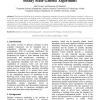Free Online Productivity Tools
i2Speak
i2Symbol
i2OCR
iTex2Img
iWeb2Print
iWeb2Shot
i2Type
iPdf2Split
iPdf2Merge
i2Bopomofo
i2Arabic
i2Style
i2Image
i2PDF
iLatex2Rtf
Sci2ools
102
click to vote
IAJIT
2010
2010
Multiple Warehouses Scheduling Using Steady State. Genetic Algorithms
: Warehouses scheduling is the problem of sequencing requests of products to fulfill several customers’ orders so as to minimize the average time and shipping costs. In this paper, a solution to the problem of multiple warehouses scheduling using the steady state genetic algorithm is presented. A mathematical model that organizes the relationships between customers and warehouses is also presented in this paper. Two scenarios of storage capacities (constants and varying capacities) and two strategies of search points (ideal point and random points) are compared. An analysis of the results indicates that multiple warehouses scheduling using the GENITOR approach with different warehouses capacities have better outcome than the usage of the traditional genetic algorithms).
| Added | 25 Jan 2011 |
| Updated | 25 Jan 2011 |
| Type | Journal |
| Year | 2010 |
| Where | IAJIT |
| Authors | Jalal Atoum, Mamoun Al Rababaa |
Comments (0)

